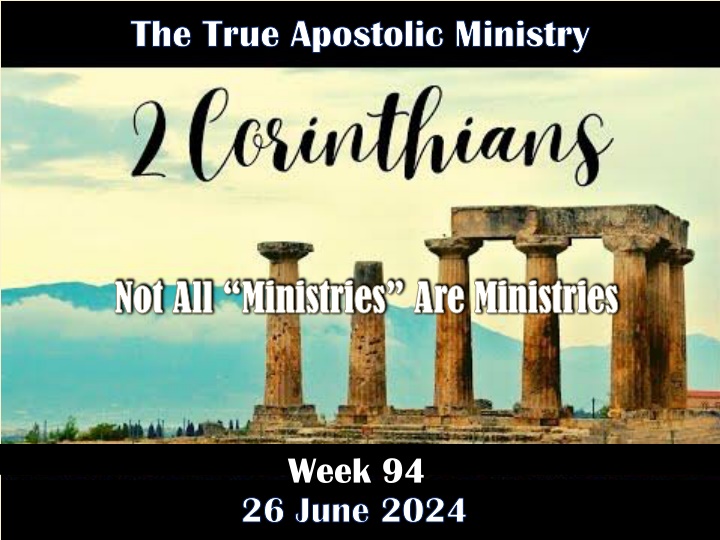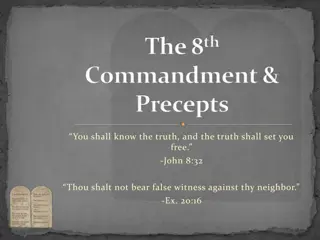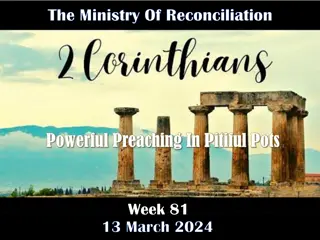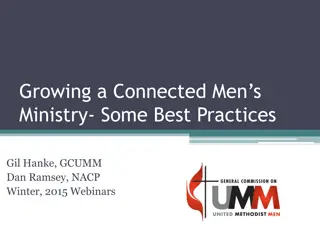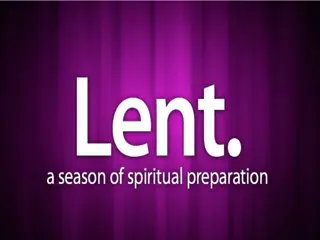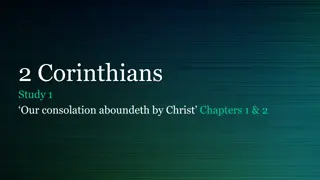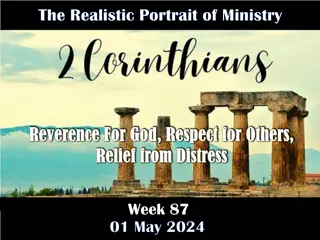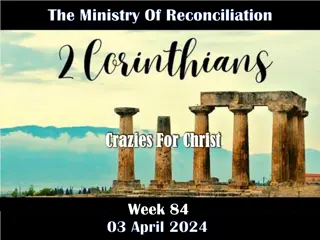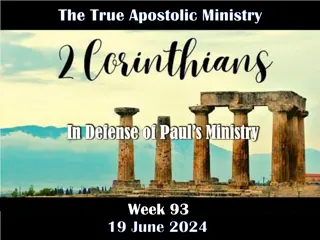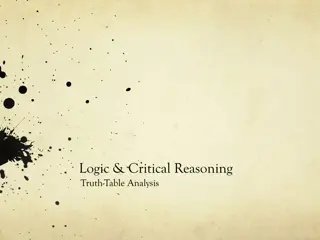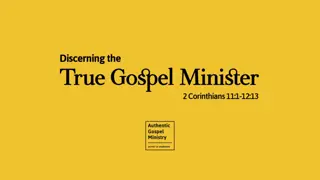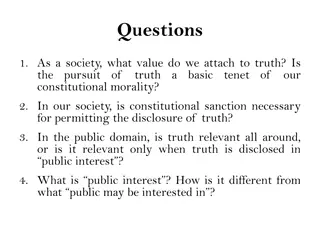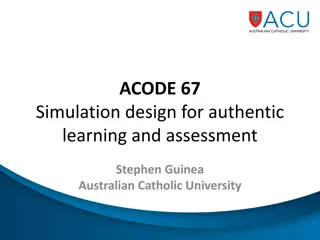Unveiling the Truth: Insights from 2 Corinthians on Authentic Ministry
Delve into the themes of authentic ministry and apostolic authority in the context of Second Corinthians. Explore Paul's defense against deceitful influences, the challenge of discerning true from false ministers, and the enduring relevance of these teachings in today's Christian landscape.
Download Presentation

Please find below an Image/Link to download the presentation.
The content on the website is provided AS IS for your information and personal use only. It may not be sold, licensed, or shared on other websites without obtaining consent from the author.If you encounter any issues during the download, it is possible that the publisher has removed the file from their server.
You are allowed to download the files provided on this website for personal or commercial use, subject to the condition that they are used lawfully. All files are the property of their respective owners.
The content on the website is provided AS IS for your information and personal use only. It may not be sold, licensed, or shared on other websites without obtaining consent from the author.
E N D
Presentation Transcript
The True Apostolic Ministry The True Apostolic Ministry Not All Ministries Are Ministries Not All Ministries Are Ministries Week 94 26 June 2024
2 CORINTHIANS INTRODUCTION In our continuing study of Second Corinthians, the themes of this letter revolves around both the theological concepts and the practical aspects of Christian living. The primary issue at Corinth was the recognition of authentic ministry and submission to apostolic authority. Paul s corrective was to provide guidance and encouragement as the church navigates the challenges that continue to influence their unity, discipline, and spiritual growth. In our study, Paul offers a passionate and stern defense of his apostolic ministry, and a warning against the deceitful influence of false apostles. He stresses his genuine love and concern for the Corinthians, his commitment to preaching the true gospel without charge, the danger posed by those who distort the truth for their own gain, and his determination to safeguard the church's purity and devotion to Christ.
2 CORINTHIANS - LESSON OVERVIEW Swindoll. . . opens with a light-hearted story about trickery and conning. He says . . . after just a few minutes of haggling, you settle on a selling price: five dollars. Not bad for a pile of clothes that doesn t fit you anyway. After all, this is a yard sale and the goal is to get rid of as much stuff by the end of the day as possible perhaps you will even make a little extra cash. The gentleman snatches the bag of clothes and hands you a piece of yellow construction paper roughly the size of a five- dollar bill. On the front is an attempt at Abraham Lincoln in green crayon, in each corner the number 5. On the other side it reads Five Dollars in big block letters that look like they were written by a five-year old.
2 CORINTHIANS - LESSON OVERVIEW What s this? you ask. It s five dollars, the man answers, eager to leave. Swindoll says, I m not exactly sure where the conversation might go, but I m confident you wouldn t respond, Oh okay. If you say so. Thanks. Have a nice day! If we don t prepare ourselves for the vicious onslaught of mean-spirited criticism, we may vary well feel like giving up or resorting to sucker punches in retaliation. Nobody would be tricked by such a shoddy counterfeit. A crayon-marked scrap of yellow paper won t pass anybody s test of authenticity. As long as there is truth, falsehood is never far behind.
2 CORINTHIANS - LESSON OVERVIEW Satan, himself, countered God s straightforward command in Genesis 2:16-17 with a similar-sounding deception in Genesis 3:1. So also, honest ministries always have been surrounded by fakes: artificial, deceptive, and dangerous. Unfortunately, people often have trouble discerning the difference between the true and the false. On the face of it, they bear a startling resemblance. But, start scratching below the surface, and soon you will uncover a dangerous deception. Paul s observations and warnings regarding false, untrustworthy ministers remain as relevant today as in the days of first-century Christianity. Perhaps more so!
2 CORINTHIANS 11:13 1Oh, that you would bear with me in a little folly and indeed you do bear with me.2For I am jealous for you with godly jealousy. For I have betrothed you to one husband, that I may present you as a chaste virgin to Christ. 3But I fear, lest somehow, as the serpent deceived Eve by his craftiness, so your minds may be corrupted from the simplicity that is in Christ.
2 CORINTHIANS 11:1-3 False teachers abound today. They are organized, well funded, and sometimes well respected. The false teachers that Paul had to contend with came in a couple of main varieties. First the Judaizers: those who believed that people could be saved only if they followed the Old Testament Law. They contented that even the Gentiles who accepted Jesus as their Messiah had to be circumcised and accept the old covenant as well as Jesus. Second the Docetists: this heresy came from those influenced by Greek philosophy who rejected the full humanity of Jesus, disparaged the physical body and the physical creation, and refused to believe in the bodily resurrection.
2 CORINTHIANS 11:1-3 It is likely that the Corinthians had encountered both heresies Docetists who rejected the physical resurrection and Judaizers who desired to contradict Paul s gospel of salvation by grace through faith in Christ alone. False teachers from both groups accused Paul of heresy. They suggested he preached a false Christ, a false gospel, and a false hope. So, here Paul warns the gullible Corinthians of the trap awaiting them. Paul starts by expressing his distaste for what he has to do Bear with me in a little foolishness (11:1). By foolishness he means having to talk about himself, which would appear like boasting about his role as an apostle.
2 CORINTHIANS 11:1-3 However, in order to put the false apostle and prophets in their places, Paul is forced to pull out his certificate of authenticity to underscore his credentials as a true apostle. In verse 1, he reminds the Corinthians they had already born with his folly, referring to his boasting, in chapter 10, about his true accomplishment in contrast to his opponents exaggerated achievement. Now, Paul reveals his jealousy for the Corinthians not stemming from irrational suspicion or unrighteous envy, but godly jealousy (11:2). When Paul feared that some in Corinth were in danger of straying from the simplicity and purity of devotion to Christ (11:3), to whom he had betrothed the church as a spiritual bride (11:2), he became justifiably jealous.
2 CORINTHIANS 11:1-3 In short, Paul knew that many in the Corinthian church had been two-timing the truth with falsehood, the true Christ with a stand-in, the authentic apostles with apostolic wannabes. Paul was jealous for their spiritual purity, as a father would be protective for his daughter s sexual purity before he presents her to her groom. Paul wanted to offer Christ a church with unadulterated loyalty to, and love for Him. But in light of the recent crises and ongoing trials in the church, Paul feared that they would be led astray from the truth (11:3). When people get caught up in false teaching, simplicity and purity get lost.
2 CORINTHIANS 11:1-3 All sort of debris seeps into the waters, clouding their thinking, and making it difficult for them to act on the simple biblical truths of the faith. Those caught up in false teaching become argumentative. They become divisive. They think things are far more complicated than they really are. They try to be nuanced or intellectually and socially respected. They become arrogant. The Bible is marginalized, or it becomes something so subject to competing interpretations that they treat it as if it had no meaning at all. All of that is the opposite of what Paul means by the simplicity and purity of devotion to Christ (11:3). The solution? Get back to and stay with the basics.
2 CORINTHIANS 11:4-12 4For if he who comes preaches another Jesus whom we have not preached, or if you receive a different spirit which you have not received, or a different gospel which you have not accepted you may well put up with it! 5For I consider that I am not at all inferior to the most eminent apostles. 6Even though I am untrained in speech, yet I am not in knowledge. But we have been thoroughly manifested among you in all things. 7Did I commit sin in humbling myself that you might be exalted, because I preached the gospel of God to you free of charge? 8I robbed other churches, taking wages from them to minister to you. 9And when I was present with you, and in need, I was a burden to no one, for what I lacked the brethren who came from Macedonia supplied. And in everything I kept myself from being burdensome to you, and so I will keep myself. 10As the truth of Christ is in me, no one shall stop me from this boasting in the regions of Achaia. 11Why? Because I do not love you? God knows! 12But what I do, I will also continue to do, that I may cut off the opportunity from those who desire an opportunity to be regarded just as we are in the things of which they boast.
2 CORINTHIANS 11:4-12 In 11:4-12, Paul shows the Corinthians three ways to know the difference between true and false teachers: 1) False teachers proclaimed another Jesus and a different gospel (11:4). 2) False teachers display attractive charisma (11:5-6). 3) False teachers are in it for the money (11:7-12). FIRST the false teachers proclaimed another Jesus and a different gospel (11:4).The term another means a similar kind. A false teacher may talk about Jesus, he may sound biblical, but he is fooling you. Heretics have historically been very skillful at using Christian terminology, but with drastically different meanings.
2 CORINTHIANS 11:4-12 They refer to Jesus, but if you ask questions about the nature and character of their Jesus, you will find they have added to or taken away from the biblical portrayal of the Lord Jesus Christ. They talk about God, but they don t mean the triune God Father, Son, and Holy Spirit. They speak of the resurrection, but they redefined the term to refer to a belief that contradicts the biblical teaching and understanding. The other Jesus preached by false teachers is a Jesus the apostles didn t preach (11:4). Consequently, the heretics present a different spirit and a different gospel. The Greek word heteros means another of a different kind. The heretics spirit is contrary to the Spirit of God.
2 CORINTHIANS 11:4-12 Instead of unity, it creates division. Instead of peace, it brings turmoil. Instead of truth, it teaches falsehood. To what other spirit could Paul be referring than the spirit of antichrist? That spirit is a devilish usurper attempting to displace the genuine work of the Spirit of God. Also, the gospel of the false teachers opposes the gospel of salvation by grace through faith in Christ alone. The false teachers under the influence of Satan, have added conditions to the free grace of the gospel; good works, circumcision, observing the Law, submitting to their leadership. Sadly, the Corinthian congregation had made room for these false teachers lies. Just as they had for the adulterers sexual immorality (1Cor. 5:1).
2 CORINTHIANS 11:4-12 Paul said with a tone of sarcasm, You bear this beautifully, meaning they tolerated this heresy as if everything were just fine. But things were not fine. preached by Paul and his fellow apostles (1Cor. 1:23). The Jesus the heretics preached was not the same Jesus unclean spirit, not the Holy Spirit of God they had received when they first believed (1Cor. 12:13). The spirit they had received in their midst was an had preached to them in the beginning, which they had received, and on which they once stood (1Cor. 15:1-5). And the gospel they permitted was not the gospel Paul establishing a foothold in the Corinthian congregation? How were these false teachers gaining a hearing and
2 CORINTHIANS 11:4-12 SECOND the false teachers displayed attractive charisma (11:5-6).The Corinthians were slowly but surely being persuaded to embrace or at least tolerate heretical teaching because it came wrapped in appealing charm. Here, Paul begins a proper defense of his apostolic authority as he directly squares off against the false apostleship of his opponents. The Judaizing critics were attempting to downplay the authority of Paul s teachings by pitting it against the superior authority of the most eminent apostles. With the term most eminent some believe Paul referred to his opponents false claims of being superior apostles who surpassed even Paul in grandeur; others believe it refers to the pillars of the Jerusalem church (Gal. 2:6-10).
2 CORINTHIANS 11:4-12 In this case, Paul wasn t pitting himself against other authentic apostles, but against false teachers who had illegitimately claimed the Twelve apostle for themselves. Quoting David K. Lowery . . . The false apostle hoped to derive authority by claiming to be associated with the Twelve. Without demeaning the Twelve, Paul affirmed his own status as an apostle of similar rank (11:5). It would have been easy for the Judaizers to hijack the reputation of Jerusalem apostles like Peter, John, or James. Why? Because the Jewish Christians living in Jerusalem had resolved to live according to the customs of their culture: keeping the Sabbath, following the Law, and observing Jewish festivals.
2 CORINTHIANS 11:4-12 However, the Jerusalem apostles had made it clear at the Jerusalem council, that this lifestyle was not to be enforced among Gentile converts (Acts 15:19-29). Nevertheless, Judaizers still interested in forcing the Law on Gentiles had appealed to the practices of the eminent apostles, in an effort to denigrate the authority of Paul and discredit his entire ministry. The authentic Jerusalem apostles never would have been involved in such a destructive and deceptive ploy. While those potent adversaries of Paul possessed great power of persuasion, and keen rhetorical skill without accurate knowledge of the truth, they had no value.
2 CORINTHIANS 11:4-12 Paul though not always eloquent in speech or attractive in appearance, excelled in his revelations and knowledge of divine mysteries (12:1-7). Ultimately, it wasn t the packaging but the contents that mattered. The fakes had outward appeal; Paul had inward substance a contrast usually found between false and true leaders. THIRD the false teachers were in it for the money (11:7- 12). Paul was in it for the ministry. In 11:7-9, Paul defends his volunteer status, while the sophists emphasize rhetorical form over content and charged their students a fee. When it came to eloquence in speech, Paul was truly an amateur rather than a professional (11:6).
2 CORINTHIANS 11:4-12 Eloquent orators trained in the best rhetorical techniques could be hired to represent a certain perspective in public. They could charge fees to give students the privilege of sitting at their feet and acquiring their knowledge. In other words, those who collected fees were clearly professionals. Paul didn t charge the Corinthians a dime for his priceless ministry to them (11:7, 9). Therefore, some concluded, Paul must be an amateur compared to the skilled orators. Paul had financed his missionary efforts through the support of what we might call sending churches (11:8).
2 CORINTHIANS 11:4-12 In fact, even when in financial need while ministering to the Corinthians, Paul refused to take support from them, waiting instead for fresh support from the churches in Macedonia (11:9). Paul had refused to accept support from the Corinthians to demonstrate his sincerity in preaching for the sake of Christ and to remove the possibility that some would accuse him of false motives (1Cor. 9:5-17). But, the false teachers had twisted it, and made Paul s free ministry seem inferior to their pay per view approach to ministry. Paul never wanted it to be said that he came to the Corinthians for the money they could have amply provided.
2 CORINTHIANS 11:4-12 Ministers of the Gospel must never make money their motive. Though the Lord directed those who proclaim the gospel to get their living from the gospel (1Cor. 9:14), Peter said that the shepherds of God s church should not engage in ministry for sordid gain, but with eagerness (1Peter 5:2). Paul concludes his contrast with the false teachers by providing a personal explanation for his boasting (11:10-12). Paul was so driven to conform to the image of Christ that when the situation required him to point out facts about himself to defeat those who claimed to be superior to him, he felt genuinely embarrassed to do so.
2 CORINTHIANS 11:4-12 As much as Paul couldn t stand boasting about himself, he resolved to continue to point out the deficiencies of those false teachers. To cut off opportunity from those who desire an opportunity to be regarded just as we are in the matter about which they are boasting (11:12). In order to rip the sheepskins from those wolves in sheep s clothing, Paul needed to meet their empty boasts with the facts from his own ministry.
2 CORINTHIANS 11:13-15 13For such are false apostles, deceitful workers, transforming themselves into apostles of Christ. 14And no wonder! For Satan himself transforms himself into an angel of light. 15Therefore it is no great thing if his ministers also transform themselves into ministers of righteousness, whose end will be according to their works.
2 CORINTHIANS 11:13-15 The popularity of those false preachers didn t surprise Paul. He recognized Satan the archenemy of the church behind it all. Those men were false apostles, deceitful workers, disguising themselves as apostles of Christ (11:13). Just as Satan himself deceives the world by masquerading as an angel of light (11:14). His devilish servants also disguise themselves as servants of righteousness (11:15). The word disguise, used three times in these verse, is the Greek word metaschematizo, which means to change in appearance. While the essence of the thing remains the same, its outward appearance looks different.
2 CORINTHIANS 11:13-15 The servants of Satan may appear right and good at first. But their end will be according to their deeds (11:15). They will fall victim to their own lies and ultimately will perish without Christ. Peter echoes the same warning in 2Peter 2:1, There will also be false teachers among you, who will secretly introduce destructive heresies, even denying the Master who bought them, bringing swift destruction upon themselves.
APPLICATIONS OF THE LESSON Don t Fall for the Fakes!
APPLICATION DONT FALL FOR THE FAKES! Swindoll closes . . . by reminding us that it does us no good to cluck our tongues and shake our heads when we see somebody led astray by a charlatan. We need to recognize that everybody is susceptible to Satan s attempts at deception. He tried to deceive Jesus Christ, so what make us think we can escape his temptations? Instead of pretending we are immune, we need to prepare beforehand for the inevitable deceptions that will come to us through Satan s servants today: false ministers and fake ministries. Here are a few tips to help keep us from falling for false ministers and fake ministries:
APPLICATION DONT FALL FOR THE FAKES! First probe deeply into the doctrinal statement of the organization and listen carefully to the theology of the individual. If the ministry doesn t have a doctrinal statement, back off and don t support financially. If they produce a doctrinal statement, read it closely with your Bible open and make sure it aligns with the orthodox truths of the Christian faith. Does it proclaim the true, perfect deity and sinless humanity of Christ? Does it acknowledge Christ as the second Person of the Trinity: Father, Son and Holy Spirit? Does it teach the depravity of humanity and the need for a Savior? Does it affirm salvation as a free gift of God, purchased at the cross by Christ alone, and available without works, based on His death and miraculous, bodily resurrection?
APPLICATION DONT FALL FOR THE FAKES! Usually those areas, the doctrines of God, Christ, and salvation, are the ones that phony ministries tamper with the most. Second examine the lives of those in leadership. Jesus says you will know the good from the bad based on their fruit (Matt. 7:20). Are the leaders accountable to anybody beyond themselves? Do they have servants hearts or do they run the ministry with absolute, unquestioned authority? Are they accessible, open to questions and willing to hear constructive criticism? Are they free from sexual and moral impurity? Do you find them free of greed and financial impropriety? We shouldn t expect our leaders to be perfect, but we should expect them to be authentic, willing to admit their imperfections.
APPLICATION DONT FALL FOR THE FAKES! And we should expect them to be accountable to a constitution, a plurality of leaders, and also to the congregation or constituency they serve. Beware of spiritual-sounding Lone Rangers! Peter warned the leaders of the churches in Asia Minor not to lord over their church, but to prove examples to the flock (1 Peter 5:3). Servant-hearted models of humility should be the standard of authentic leadership. Remember, you have a message of hope based on Jesus Christ and the Word of God. When you come into contact with a fake ministry or a false teacher, share the message but stay on the offensive.
APPLICATION DONT FALL FOR THE FAKES! Know your Bible, stick to the central issues of Jesus Christ and salvation. Don t entertain their doctrines for one moment. What may look like a pot of gold at the end of a rainbow may really be a coiled rattler waiting to strike.
NEXT CLASS 11 July 2024 Before next class, read the below chapters in the KJV and in one other versions of the Bible, i.e., NIV, NRSV, TLB, CEV, etc Chapter 11:16 33 The Flip Side of Fruitful Ministry
